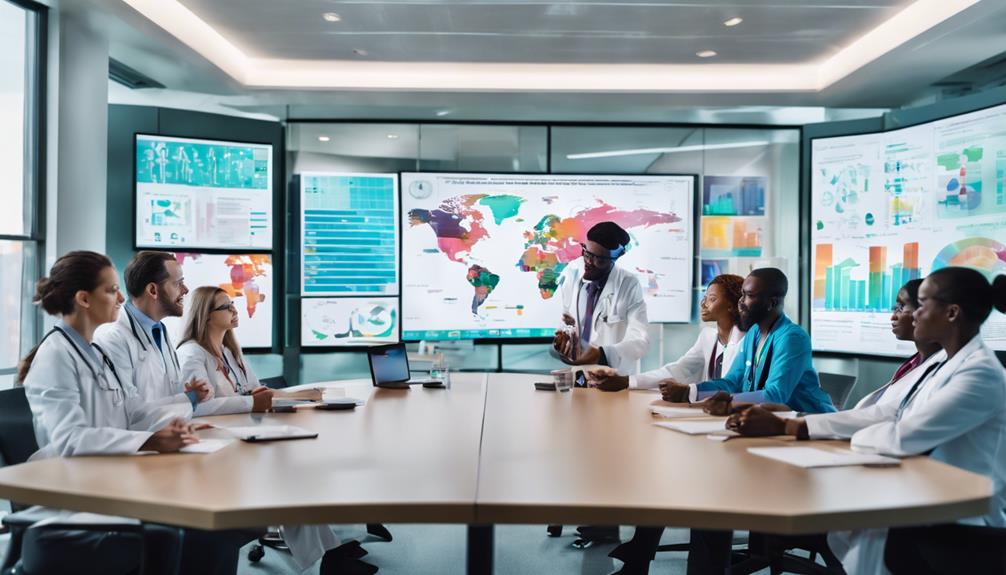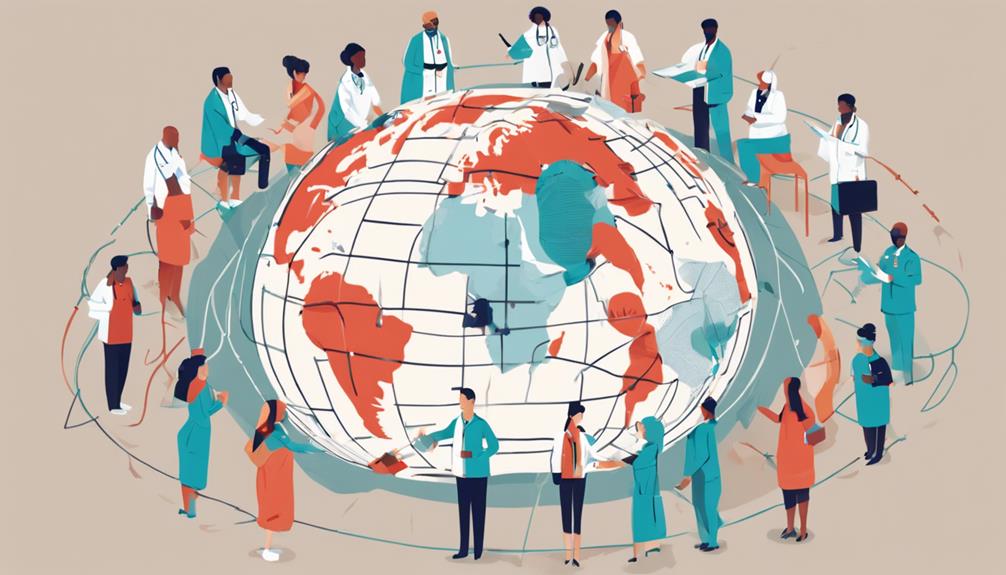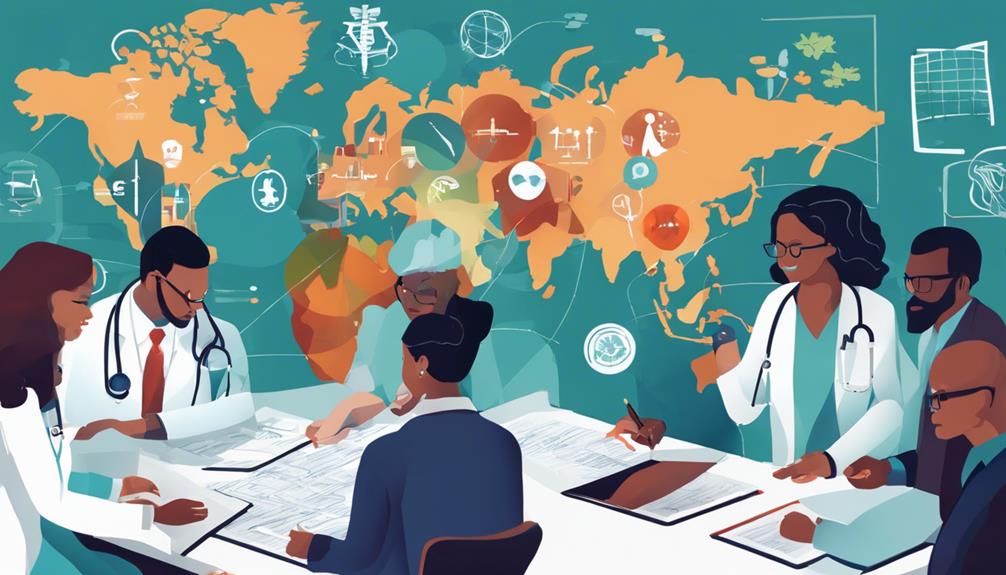The WHO Health Treaty amendments focus on strengthening global health governance by addressing gaps exposed by recent pandemics. You'll find they emphasize enhanced international collaboration, data sharing, and equitable resource distribution. Key proposals include clearer guidelines on health data practices, improved emergency response mechanisms, and a commitment to global health equity. Member states are expected to adopt effective strategies and promote partnerships for better health outcomes. However, challenges related to funding and equity persist, highlighting the complexity of implementing these amendments. Exploring further will reveal the implications these amendments have on public health policies worldwide.
Overview of the Health Treaty

The Health Treaty serves as a critical framework for global health governance, aiming to enhance international collaboration in addressing public health challenges. Its history traces back to previous agreements that highlighted the need for a unified response to health crises.What Does Yoga DoWhat Can We Do to Ensure Good Health for All
You'll find that the treaty builds on lessons learned from past pandemics, such as H1N1 and Ebola, emphasizing a proactive rather than reactive approach. Through structured mechanisms, the treaty promotes data sharing, resource allocation, and coordinated responses among nations.
It recognizes that health threats don't respect borders and that a collaborative stance is essential for effective prevention and management. For instance, the treaty envisions a framework where countries can quickly mobilize resources in response to emerging health threats, thereby strengthening global health systems.
As you analyze its implications, consider how the treaty addresses gaps in current global health governance. By establishing clear roles and responsibilities, it aims to streamline efforts, ensuring that all nations can contribute to and benefit from a cohesive health strategy.
Ultimately, the Health Treaty represents a significant step toward creating a resilient global health architecture.
Key Proposed Amendments
As you explore the key proposed amendments, you'll notice a focus on strengthening global health standards and enhancing emergency response mechanisms.
These changes aim to create a more robust framework for addressing health crises.
Strengthening Global Health Standards
Strengthening global health standards requires a thorough reevaluation of existing protocols and the implementation of key proposed amendments that address emerging health threats. You must prioritize global health equity to guarantee that all countries, regardless of their economic status, have access to essential health resources. This includes standardizing health data collection and sharing practices, which will facilitate better response strategies during pandemics.
The proposed amendments emphasize enhancing pandemic preparedness by establishing clear guidelines for surveillance and reporting of infectious diseases. By adopting a unified approach, nations can better understand health trends and respond swiftly to outbreaks. These amendments advocate for stronger collaboration among countries, fostering a network of information exchange that can prevent localized outbreaks from escalating into global crises.
Moreover, promoting equitable vaccine distribution is essential. Confirming that vaccines are accessible to underserved populations not only protects those communities but also contributes to overall global health resilience.
Enhancing Emergency Response Mechanisms
Enhancing emergency response mechanisms is crucial for effectively addressing health crises, guaranteeing that nations can act swiftly and cohesively when faced with outbreaks or disasters. The proposed amendments emphasize the importance of establishing robust systems for crisis communication.
By streamlining communication channels between countries and international organizations, you'll improve the speed and clarity of information sharing, which is critical during emergencies.
Equally important is optimizing resource allocation. These amendments call for a strategic framework that allows for the rapid deployment of medical supplies, personnel, and financial support where they're needed most.
For instance, establishing a global reserve of essential medical resources could greatly reduce response times in crises.
Furthermore, integrating data-driven decision-making into emergency protocols guarantees that actions taken are based on real-time information. This approach not only enhances efficiency but also builds public trust in health authorities.
Impact on Global Health Security

The recent amendments to the WHO Health Treaty aim to bolster global health security by establishing stronger frameworks for international cooperation and rapid response to health emergencies.
These changes prioritize global vaccination efforts, ensuring that vaccines are accessible to all nations, particularly those with fewer resources. By addressing barriers to vaccine distribution, the amendments promote health equity, allowing vulnerable populations to receive timely immunizations during crises.
You'll notice that these amendments enhance data sharing among countries, facilitating quicker identification of emerging threats. This transparency is critical in coordinating responses and allocating resources effectively. With improved communication channels, nations can learn from each other's experiences, making collective action more efficient.
Furthermore, the emphasis on solidarity and collaboration means that no country will be left behind during health emergencies. By investing in global health infrastructure and workforce training, the amendments set the stage for a more resilient health system. This proactive approach not only mitigates the impact of future pandemics but also fosters a culture of preparedness.
Ultimately, these changes signify a commitment to a safer, healthier world, reinforcing the idea that global health security is a shared responsibility.
Role of Member States
As you examine the role of member states in the WHO Health Treaty amendments, you'll find that each country carries specific responsibilities that impact global health outcomes.
Understanding the decision-making processes is essential, as it reveals how member states influence the effectiveness of these amendments.
However, you'll also encounter significant implementation challenges that can hinder progress and require careful navigation.
Responsibilities of Member States
Fulfilling their commitments under the treaty, member states play an essential role in shaping global health policies and guaranteeing equitable access to healthcare resources. Each state has specific member state obligations that require them to implement effective public health strategies, allocate resources efficiently, and prioritize vulnerable populations. These obligations aren't merely guidelines; they represent a commitment to global health equity.
To guarantee compliance with these obligations, accountability measures are crucial. Member states must regularly report on their healthcare initiatives and outcomes, allowing for transparent assessments of progress. This data-driven approach not only fosters trust but also enables the international community to recognize best practices and identify areas needing improvement.
Moreover, collaboration is key. By sharing knowledge and resources, member states can collectively address health crises and enhance their preparedness for future challenges. Effective partnerships strengthen the overall health system, making it more resilient.
Decision-Making Processes Explained
Member states actively engage in decision-making processes that shape health policies and strategies, fostering a collaborative environment aimed at achieving collective goals in global health. Each member state evaluates decision criteria that reflect their national contexts, priorities, and capacities. This guarantees that decisions aren't only aligned with global health objectives but also resonate with local needs.
Stakeholder engagement plays an essential role in this process. By involving various stakeholders—such as health professionals, civil society, and private sector representatives—member states can gather diverse perspectives and expertise. This inclusivity enhances the legitimacy and effectiveness of the decisions made.
Moreover, member states often utilize established frameworks to assess potential health interventions and policies. These frameworks guide the evaluation of evidence, ensuring that decisions are grounded in scientific research and best practices. This analytical approach helps in identifying the most impactful strategies for improving health outcomes.
Implementation Challenges Faced
What challenges do member states encounter when trying to implement health treaty amendments effectively?
One significant issue is the inconsistent funding allocation. Many countries struggle to secure the necessary financial resources to meet the requirements set forth in these amendments. Without adequate funding, even well-designed plans can falter, leaving gaps in healthcare infrastructure and services.
Moreover, stakeholder engagement plays a critical role in the successful implementation of these treaties. Member states often face difficulties in mobilizing various stakeholders, including healthcare providers, civil society, and local governments. Effective collaboration is essential for aligning goals and ensuring that everyone is on board with the proposed changes. However, divergent interests and priorities can hinder this process.
Additionally, the lack of clear communication channels can further complicate stakeholder engagement. When information isn't shared transparently, misunderstandings can arise, leading to resistance or apathy toward the amendments.
Ultimately, overcoming these challenges requires a concerted effort from member states to prioritize funding and foster robust stakeholder partnerships. By addressing these barriers, they can enhance the implementation of health treaty amendments more effectively.
Challenges and Controversies

Maneuvering the complex landscape of the WHO Health Treaty amendments reveals significant challenges and controversies that demand careful consideration from all stakeholders involved.
One of the primary issues is health equity. You might notice that differing national capacities can lead to unequal access to resources, impacting the effectiveness of global health initiatives. This disparity often exacerbates existing inequalities, particularly in low-income countries that struggle with vaccine distribution.
Another point of contention is the balance between national sovereignty and global health obligations. Some countries express concern that the amendments could infringe on their autonomy, making them resistant to fully commit to the treaty's provisions. This resistance can hinder collaborative efforts essential for addressing global health crises.
Moreover, the complexities of implementing standardized guidelines can lead to confusion and inconsistency in response strategies. Stakeholders must navigate political, economic, and social factors that can complicate the execution of these amendments.
As you investigate these challenges, it's vital to weigh the potential benefits against the controversies to guarantee that the treaty ultimately promotes equitable health outcomes worldwide.
Future of International Health Law
The future of international health law hinges on the ability to adapt legal frameworks to address emerging global health challenges while ensuring equitable access and collaboration among nations.
As you look ahead, you'll notice that global health governance is becoming increasingly complex, driven by factors such as climate change, pandemics, and health inequities. These challenges necessitate a robust legal response that prioritizes international cooperation.
You'll find that the effectiveness of international health law depends on nations working together to share data, resources, and best practices. For instance, the COVID-19 pandemic highlighted the critical need for transparent communication and coordinated responses. Strengthening treaties and agreements can facilitate this collaboration, ensuring that all countries, regardless of their economic status, can access essential health resources.
Moreover, the integration of human rights principles into international health law can enhance equity, ensuring that vulnerable populations aren't left behind.
As you consider the future, remember that fostering an inclusive approach to global health governance will be essential for building resilience against future health crises. Through collaborative efforts, you can help shape a more effective and equitable international health framework.
Implications for Public Health Policy

Adapting international health law to emerging challenges directly influences public health policy, as it shapes the frameworks that govern health interventions and resource allocation on a global scale.
You'll find that these amendments can enhance public health equity by ensuring that resources and support are distributed fairly, particularly in low-income countries. By prioritizing equitable access to healthcare services, you'll create a more resilient global health system.
Furthermore, these treaty amendments can bolster global disease prevention efforts. They encourage countries to collaborate on surveillance, data sharing, and preparedness strategies, which are essential in combating pandemics. For instance, a unified approach to vaccine distribution can prevent outbreaks and protect vulnerable populations.
You should also consider the implications for local policies; as international standards evolve, they can inform national regulations, ensuring that public health initiatives align with global best practices.
Ultimately, these changes demand a proactive stance from policymakers, emphasizing that global health security is interconnected. By embracing these amendments, you're not just responding to current challenges but also laying the groundwork for sustainable public health advancements in the future.
Conclusion
In conclusion, the proposed amendments to the WHO Health Treaty could greatly reshape global health governance.
By enhancing collaboration and accountability among member states, these changes aim to bolster global health security.
However, challenges remain, including political resistance and varying national interests.
As you consider the implications for public health policy, it's crucial to weigh the potential benefits against the complexities of international cooperation.
The future of health law hinges on collective commitment and adaptive strategies.
